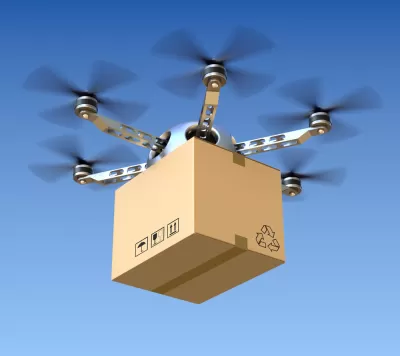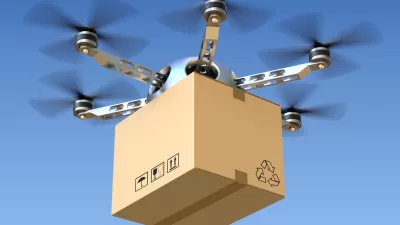Ultra-fast drone delivery promises convenience, but comes at a high cost for workers, the environment, and public space.

Drone delivery promises ultra-fast, convenient delivery of everyday goods right to your door. But there's a darker side, write Michael Richardson, Jake Goldenfein, and Thao Phan. "Drone delivery at scale will transform the skies, change expectations for speedy delivery, and hide the labour that makes it possible."
Wing, an Alphabet-owned delivery company that has made 100,000 deliveries to date in Australia, "operates much like many app delivery platforms. After signing up, customers use the smartphone app to place their orders. Orders are then packed at local base stations and flown to their destinations by Wing’s drones." But questions remain about how the service would operate in more complicated environments than the "clear and uncomplicated airspace" and "flat, regular urban environment" of its test sites, Canberra and Logan. Additionally, "automated" tech obscures the hidden human cost.
In the same way that Amazon's private delivery services created higher demand for ultra-fast package delivery, the "unbelievably fast" delivery times promised by Wing shifts customer expectations for other delivery services. "While Wing’s drones are autonomous, the service still relies on human labour. Pilots monitor flight paths, packers parcel up the products, and maintenance staff take care of the hardware and software. All of these workers must perform to satisfy the 10 minute delivery time." These "punishing delivery times," the authors argue, "can be dangerous for worker safety and devastating for morale."
In addition to the harm caused to workers, "drone delivery may also have hidden environmental costs:" lithium mining for batteries, energy consumption for data centers, more packaging and waste, and potential risks to birds and habitats. Moreover, "[d]rone delivery risks privatising a new layer of that common space, and handing it over to Alphabet and others." Australia–and other countries–would have to change their regulations regarding drones and create new digital infrastructures, a step that Alphabet is heavily involved in. "While city skies crowded with delivery drones might be far away, the groundwork is being laid right now. Communities, businesses and workers need to be a much bigger part of the process of deciding if they want that future."
FULL STORY: Privatising the sky: drone delivery promises comfort and speed, but at a cost to workers and communities

Planetizen Federal Action Tracker
A weekly monitor of how Trump’s orders and actions are impacting planners and planning in America.

Restaurant Patios Were a Pandemic Win — Why Were They so Hard to Keep?
Social distancing requirements and changes in travel patterns prompted cities to pilot new uses for street and sidewalk space. Then it got complicated.

Map: Where Senate Republicans Want to Sell Your Public Lands
For public land advocates, the Senate Republicans’ proposal to sell millions of acres of public land in the West is “the biggest fight of their careers.”

Maui's Vacation Rental Debate Turns Ugly
Verbal attacks, misinformation campaigns and fistfights plague a high-stakes debate to convert thousands of vacation rentals into long-term housing.

San Francisco Suspends Traffic Calming Amidst Record Deaths
Citing “a challenging fiscal landscape,” the city will cease the program on the heels of 42 traffic deaths, including 24 pedestrians.

California Homeless Arrests, Citations Spike After Ruling
An investigation reveals that anti-homeless actions increased up to 500% after Grants Pass v. Johnson — even in cities claiming no policy change.
Urban Design for Planners 1: Software Tools
This six-course series explores essential urban design concepts using open source software and equips planners with the tools they need to participate fully in the urban design process.
Planning for Universal Design
Learn the tools for implementing Universal Design in planning regulations.
Heyer Gruel & Associates PA
JM Goldson LLC
Custer County Colorado
City of Camden Redevelopment Agency
City of Astoria
Transportation Research & Education Center (TREC) at Portland State University
Camden Redevelopment Agency
City of Claremont
Municipality of Princeton (NJ)





























